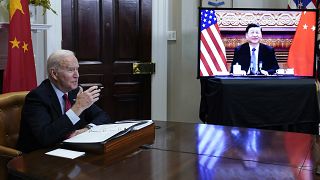
Two key figures in determining the course of a war half a world away, President Joe Biden and China’s Xi Jinping spoke on Friday as the White House looks to deter Beijing from providing military or economic assistance for Russia’s invasion of Ukraine.
Planning for the call has been in the works since Biden and Xi held a virtual summit in November, but differences between Washington and Beijing over Russian President Vladimir Putin’s prosecution of his three-week-old war against Ukraine are expected to be at the centre of the call.
White House press secretary Jen Psaki said Biden would question Xi about Beijing’s “rhetorical support” of Putin and an “absence of denunciation” of Russia’s brutal invasion of Ukraine.
“This is an opportunity to assess where President Xi stands,” Psaki said.
China on Friday again sought to highlight its calls for negotiations and donations of humanitarian aid, while accusing the U.S. of provoking Russia and fuelling the conflict by shipping arms to Ukraine.
“China has called for every effort to avoid civilian casualties all the time,” Foreign Ministry spokesperson Zhao Lijian told reporters at a daily briefing. “Which do the civilians in Ukraine need more: food and sleeping bags or machine guns and artillery? It’s easy to answer.”
In an attempt to show international support for China’s position, state broadcaster CCTV said Xi discussed Ukraine in phone calls with South African President Cyril Ramaphosa and Cambodian Prime Minister Hun Sen, adding that the leaders’ views were “extremely close”.
The US-China relationship, long fraught, has only become more strained since the start of Biden’s presidency. Biden has repeatedly criticised China for military provocations against Taiwan, human rights abuses against ethnic minorities and efforts to squelch pro-democracy advocates in Hong Kong.
But the relationship may have reached a new low with the Russian invasion.
In the days after Putin deployed Russian forces in Ukraine, Xi’s government tried to distance itself from Russia’s offensive but avoided criticising Moscow. At other moments, Beijing’s actions have been provocative and have included amplifying unverified Russian claims that Ukraine ran chemical and biological weapons labs with US support.
Earlier this week, the US informed Asian and European allies that American intelligence had determined that China had signalled to Russia that it would be willing to provide both military support for the campaign in Ukraine and financial backing to help stave off the impact of severe sanctions imposed by the West.
Secretary of State Antony Blinken on Thursday reiterated that the Biden administration remains concerned that China is considering providing military equipment to Russia. He said Biden would make clear to Xi “that China will bear responsibility for any actions it takes to support Russia’s aggression, and we will not hesitate to impose costs”.
Tags: Çin, DoğuTürkistan, eastturkistan, genocide, killerchina, Soykırım, uyghur, uygur
